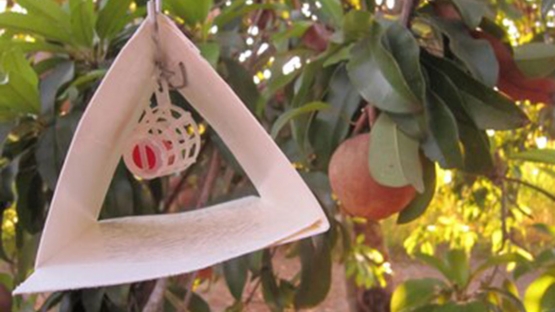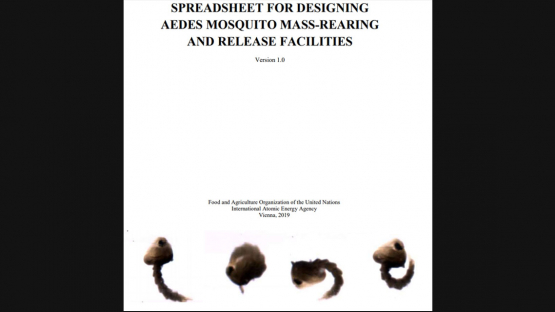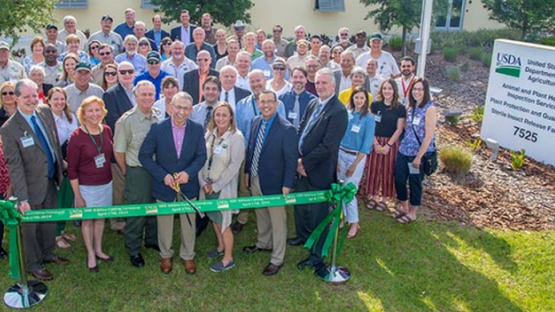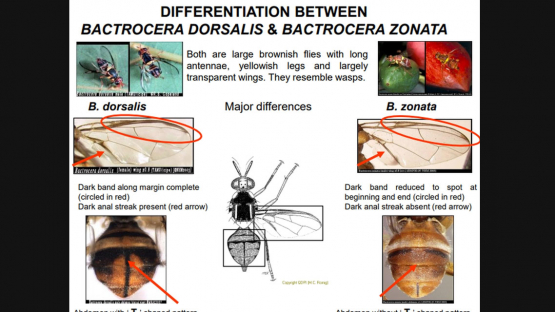IPC highlights

The Mediterranean fruit fly outbreak in Manzanillo, Colima, Mexico, Has Been Officially Declared Eradicated
An outbreak of the Mediterranean fruit fly (Ceratitis capitata, Wied.) was declared eradicated on 24 April 2020 after one year of intensive actions carried out under the framework of an emergency response protocol.

And the African Union Commission Excellence Award Goes to…
Marc Vreysen and Udo Feldmann from the Joint FAO/IAEA Division of Nuclear Techniques in Food and Agriculture recently received recognition by the African Union - InterAfrican Bureau for Animal Resources (AU-IBAR) for their unwavering commitment and outstanding contributions to the control of the tsetse flies in Africa using the sterile insect technique (SIT).

Fruit Sampling Guidelines for Area-Wide Fruit Fly Programmes
Fruit sampling in Area-Wide Fruit Fly Integrated Pest Management (AW-IPM) programmes, is applied to detect the presence or absence of the target fruit fly species in an area. It is also applied to monitor immature stages of the pest to determine those fruits that are hosts as well as fruit fly spatial and temporal distribution and abundance.

Use of Entomopathogenic Fungi for Fruit Fly Control in Area-Wide SIT Programmes
Entomopathogenic fungi have been reported as effective natural enemies of insect pest. In fruit flies there is empirical evidence that some common fungal species are efficient biological control agents. The purpose of this publication is to serve as a guide for the implementation of microbial control through the use of fruit flies as vectors of fungus conidia. This document is also available in Spanish.

E-Learning Course on Packing, Shipping, Holding and Release of Sterile Flies in Area-Wide Fruit Fly Control Programmes
Based on the FAO/IAEA guidelines, this e-learning course introduces and explains the principles of packing, shipping, holding and release of sterile flies in area-wide fruit fly management programmes.

Meeting of the International Plant Protection Convention (IPPC) Technical Panel on Phytosanitary Treatments (TPPT)
Phytosanitary treatments (PTs) are essential for controlling regulated pests in articles and goods, especially those that are regulated for trade on an international scale. The IPPC PTs are an alternative to methyl bromide and help protect biodiversity.

Guide for Establishing and Maintaining Pest Free Areas
This guide is aimed at providing guidance on the establishment and maintenance of pest free areas (PFA), pest free places of production (PFPPs), pest free production sites (PFPSs) and areas of low pest prevalence (ALPPs) as phytosanitary measures to facilitate safe trade and improve the phytosanitary status of a country.

Spreadsheet for Designing Aedes Mosquito Mass-Rearing and Release Facilities Version 1.0
The FAO/IAEA Interactive Spreadsheet is intended to be used for the design of insect mass-rearing facilities for Aedes mosquito.

New Sterile Insect Release Facility in Sarasota, Florida. The Facility Supports the USDA, APHIS Mediterranean Fruit Fly (Medfly) Preventive Release Program
APHIS’ Plant Protection and Quarantine (PPQ) program marked the opening of its newest Sterile Insect Release Facility in Sarasota, Florida.

Exploring Genetic, Molecular, Mechanical and Behavioural Methods of Sex Separation in Mosquitoes
Major human diseases such as malaria, dengue, chikungunya, Zika and yellow fever are transmitted by mosquito species which are members of the Aedes and Anopheles genera.

Developing Area-Wide SIT Against the European Grape Vine Moth (Lobesia Botrana) in Chile
The grapevine moth or Lobesia botrana (Lepidoptera, Tortricidae) was detected for the first time in Chile in the Linderos area of the Metropolitan Region in April 2008.

Another Great Achievement: the Reorganized Suite of Fruit Fly Standards are Now Available in English on the IPP
ISPMs 26, 30, 35 and 37 have successfully been reorganized to reflect the decisions of CPM-13 (2018). This reorganization made the suite of fruit fly standards more logical and simple, which will help in their implementation and facilitate safe trade.

Tiny Pest, Big Problem: South Africa's Citrus Challenge
The false coddling moth has been plaguing South Africa's citrus crops, putting this lucrative industry in danger. Now farmers are working with top scientists to sterilize these pests and keep this industry growing. (Video Source: CNN)

Machine Learning Can Control Tsetse Flies
FEMALE tsetse flies mate for life. Or, to put it more accurately, they mate once in a lifetime. That gives those who would control these pests an opportunity. A female that mates with a sterile male will have no offspring.

Update of the Technical Leaflet Released in Six Languages on the Discrimination Between Two Invasive Bactrocera Fruit Fly Pests
Bactrocera zonata (peach fruit fly) sometimes overlaps in terms of distribution with Bactrocera dorsalis (Oriental fruit fly). A technical leaflet to help to discriminate among these two invasive pest species, was updated and produced. This document is also available in: Arabic, Chinese, French,Portuguese and Spanish.

Nuclear Technique Helps Prevent Insects from Harming Your Coffee Beans
Recent studies have shown that the Mediterranean fruit fly inflicts economic damage to coffee production by reducing weight of the coffee bean and affecting quality. The sterile insect technique integrated with other control methods is being used to control the pest protecting coffee production and industry. This video is also available in Spanish.

Nuclear Technique Helps Prevent Insects From Harming Your Coffee Beans
Using the sterile insect technique, IAEA scientists are seeking to reduce the damage caused by the Mediterranean fruit fly to the coffee industry.

Nuclear Technology Helps the Dominican Republic Fight Insect Pests
In the Dominican Republic, agriculture is the second most important industry and a major employer. In March 2015, the outbreak of a highly destructive agricultural pest, the Mediterranean fruit fly, was detected in the country.

Successful Control of the Mediterranean Fruit Fly in Jordan
An IAEA and FAO supported sterile insect technique (SIT) project to control the medfly in a citrus orchard in the south Jordan Valley.

Third FAO/IAEA International Conference on Area-Wide Management of Insect Pests: Integrating the Sterile Insect and Related Nuclear and Other Techniques
The Conference was held from 22 - 26 May 2017 at the Vienna International Centre, Vienna, Austria. The successful conference was attended by 360 delegates from 81 countries, six international organization, and nine exhibitors.
- ‹ previous
- 2 of 4
- next ›

